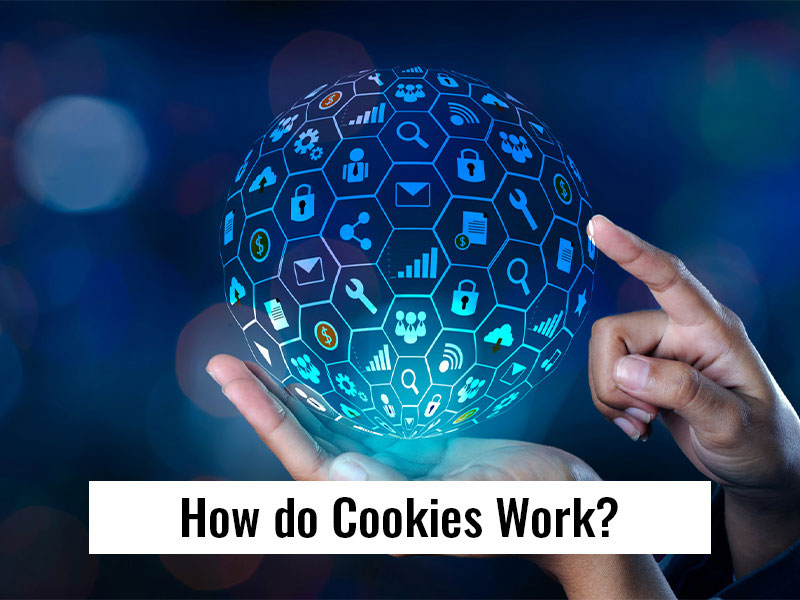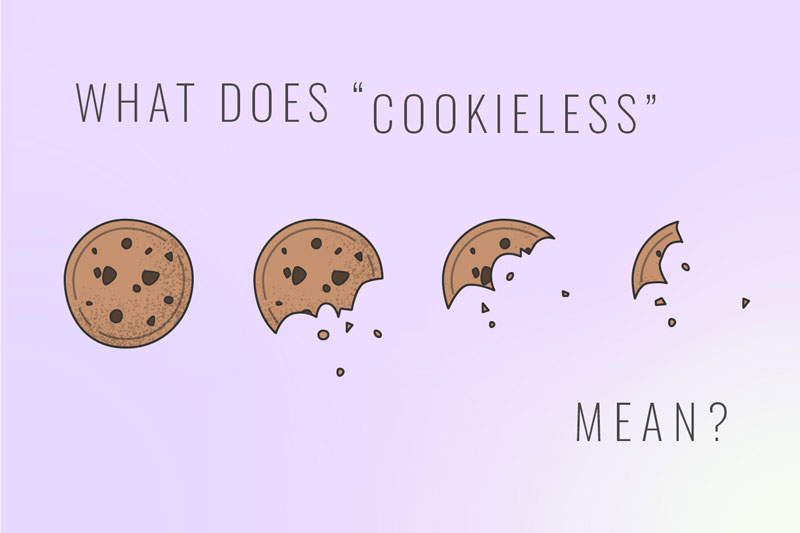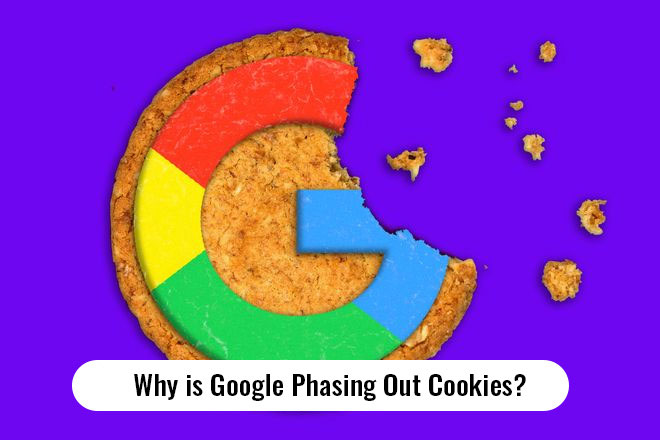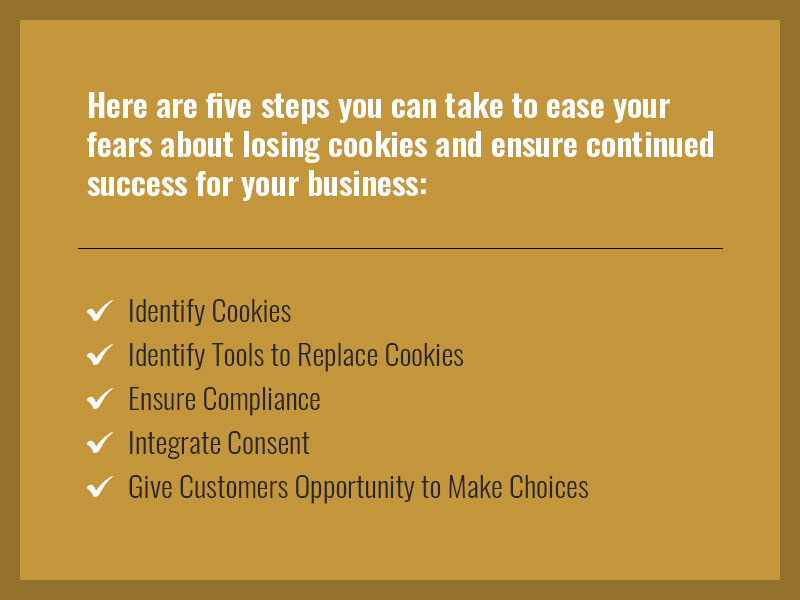
The Cookieless Future: Why are Cookies Going Away?
The arrival of the no-cookie future is almost upon us. Since Google announced that by the end of 2023, it would stop supporting Third-Party Cookies in Google Chrome, there are a few things to discuss regarding cookies going away.
Cookies are a common term in computing that everyone understands. It’s safe to assume that every computer user has already heard of cookies. Everyone who browsed the internet has either opted in or out of them, although someone might disagree with this statement. However, one day, such tracking technologies may disappear forever. After Google announced it would cease utilizing third-party cookies, the cookieless future appears to be approaching faster than you think.
As a result, in this post, we will describe what a cookieless future is, what to anticipate from it, and how to get ready for it now that Third-Party Cookies are going away in browsers starting with Google Chrome, which will cease supporting them in one or two years.
The Importance of Cookies
Whenever you visit a website, that site will send over a text document called a cookie. This is to remember any helpful information from your last visit or visit to save you time inputting that data later.
You can find cookies on nearly every site nowadays, and they’ve become an essential part of web browsing for many people. This is because cookies keep track of user activity on websites and apps so that when you come back at a later date, the load times are much faster since it doesn’t have to relearn everything about yourself again. In addition, preferences and other bits of prior information are often stored in cookies.
Let’s get this party started! Cookies are a fantastic tool for marketers to enhance users’ web experience and the advertisements and material displayed based on their interests. You can gather both behavioral and sensitive data with cookies. Furthermore, there are numerous sorts of cookies on websites. We’re now going to go through some of them. These classifications may be divided into various types, and these sections highlight the most popular websites. Sit tight; we’re about to begin!
Cookies for Performance
The purpose of this cookie is to collect data about website usage statistics and visitor information. This helps us track a user’s behavior on the site and what pages are being accessed most frequently.
Strictly Necessary Cookies
Cookies are used to keep track of a user’s activity on the site. These technical cookies are required for online operation. Users cannot access the site or use its services in such circumstances. They don’t utilize advertisements, either. This service includes website security measures such as quicker web page load times without the requirement to reload specific resources every time a new page is opened.
Functionality Cookies
Cookies are used for basic tasks and are necessary for the website’s proper functioning. They mainly keep track of language, currency, or location preferences. To remember the user’s username and password, so they don’t have to every time they visit the site, and these cookies store the user’s preferences like font size, typeface, and other display settings.
Targeting Cookies
These cookies are used to display personalized ads to users. They also help limit the number of times a user sees an ad and can measure the effectiveness of advertising campaigns.
Other cookies don’t fit into these categories, but the most common ones are those we have just mentioned. Now that you know what cookies are and what types exist, you may wonder how they work.
How do Cookies Work?

A server sends a tiny text file to a user’s device when they visit a website (computer, tablet, or smartphone). This file is commonly known as a “cookie.” The cookie is saved on the user’s device and used to track their activity on that site.
Cookies are erased from a user’s device after they close their browser. These are known as “session” cookies. Other cookies remain on a user’s computer for a set time after the browser is closed and are referred to as “persistent” cookies. Cookies may be provided by the website the user is viewing (first-party cookies) or another website that serves content to the primary website (third-party cookies).
A first-party cookie tracks a user’s activity on a website and stores information such as preferences and login credentials. A third-party cookie is used for advertising or tracking purposes by another entity.
Differences Between First and Third-party Cookies
Cookies are small pieces of data stored on your computer by a website. They allow the site to keep track of your activity and build a profile of you based on your browsing history. The method by which cookies are gathered distinguishes first-party cookies from third-party cookies. First-party cookies are generated based on the site you visit and may collect information such as usernames, passwords, product lists, etc. Websites use first-party cookies to maintain a user’s preferences across multiple locations. It also tells the website when someone revisits it.
In contrast, a third-party cookie is created from a domain other than the website that a user is currently on. This type of cookie can be used to track a user’s activity across multiple websites and mainly collects data for advertising purposes, such as a user’s browsing history and demographics.
Read more: HOW TO FIND THE RIGHT KEYWORDS FOR YOUR CONTENT MARKETING EFFORTS?
What does “Cookieless” Mean?

A “cookieless” marketing strategy is one in which marketers use third-party cookies less frequently, thus minimizing their reliance on these tiny bits of data transferred between advertisers that contain personal identifiers while people surf the web. This significantly impacts websites that utilize third-party cookies to identify and target users with specific advertising or marketing.
Cookies are files that a website places on your computer, which allow it to remember you and provide features such as storing shopping cart contents. Cookies generally store information about your computer so that the website can identify you as a unique visitor by using unique identifiers like registration numbers or session IDs. Other identifiers (your IP address, for example) will uniquely identify your computer to learn more about your online identity after deleting cookies.
In a nutshell, cookieless means that websites keep your data by using other identifiers, such as IP addresses or device IDs, instead of cookies. These alternative approaches will now monitor your online activity. In March 2021, Google announced it would no longer collect Personally Identifiable Information (PII) graphs from alternative identifiers like users’ email addresses. While the loss of third-party cookies could still significantly impact marketers relying on analytics data (like session IDs) to target ads, Google opted out of PII collection methods because it has implemented what seems to be a more secure alternative: Federated Learning of Cohorts (FLoC), aka Privacy Sandbox.
The Google Ads platform, known as FLoC, is a “privacy-first” and “interest-based” advertising technology (AdTech). Instead of using third-party cookies to monitor a user’s online activity across the internet, Google’s web browser, Chrome, will do this instead. Users will be categorized into audiences or ” cohorts” based on their preferences. Advertisers will have unrestricted freedom to target their messages to these unidentified groups rather than individuals.
Why is Google Phasing Out Cookies?

Google’s Director of Chrome Engineering, Justin Schuh, has stated that Google is phasing out third-party cookies due to user demand for more privacy. He said that users want transparency, choice, and control over how their data is used and that Google is evolving to meet these demands.
This is all true. Eighty-six percent of individuals felt that their data privacy was becoming a growing concern. A further 78% were concerned about the amount of data collected. But perhaps Google’s decision to eliminate third-party cookies is related to the Irish Data Protection Commission’s (DPC) investigation into Google’s online advertising company. It’s no exaggeration to say that similar high-profile investigations and growing consumer worries have created the perfect storm for Google, forcing it to react.
In other words, Google’s competitors and peers aren’t happy about the decision. The Association of National Advertisers was particularly critical when Google announced its plans to phase out third-party cookies in January 2020. In their statement, they called google out for their “deep disappointment” with the choice – as it would “significantly” disrupt advertising as we know it. They even accused Google of purposely making things more difficult for startups by “cutting off the economic oxygen that [they] need to survive.” A three-year delay hasn’t changed anyone’s mind.
In September 2021, GetApp surveyed in partnership with Hubspot to reveal the following results:
- 41% of marketers believed their biggest challenge was the inability to track the correct data.
- 44% of marketers predicted they would need to quintuple their spending from 5% to 25% to hit the same goals in 2022 as they did in 2021.
GetApp’s survey discovered that nearly a fourth of marketers anticipate reinvesting in email marketing software come 2022. Still, data management and customer data platforms have already begun preparing for such an occurrence.
Customer data platforms have experienced a significant increase in popularity in 2021, with the CDP industry projected to generate $1.6 billion in revenue. Marketers are gradually moving away from data management platforms and opting for customer data platforms. This is most likely because marketers are concentrating more on first-party data. DMPs mostly rely on third-party data, keep data for shorter periods, and cannot identify users to produce the most accurate audiences possible because they can’t do so with a CDP.
What is the Cookieless Future?
The cookieless future refers to the shift in the digital landscape that will occur when Google phases out third-party cookies in its Chrome browser. This change was announced in January 2020 but has been postponed until 2023. Since so much digital marketing activity relies on data from third-party cookies, a large majority of the ad tech sector – as well as publishers, advertisers, and marketers – are in a massive race to find viable alternatives.
Alternative identification techniques based on non-cookie identifiers, such as email addresses, will be a vital component of the non-Google technology. However, the quality and quantity of a company’s first-party data will likely determine the effectiveness of specific cookie replacements like alternative ID technologies. As a result, many businesses now focus on amassing large amounts of valid and accurate consumer information.
How will Cookieless Future Impact Users?
Now that third-party cookies are being phased out, it’s worth knowing a few key points about how this will affect everyone involved.
Removing third-party cookies from browsers will significantly impact targeted advertising for consumers. In a cookieless world, there would be no such massive amount of data to rely on for marketers. As a result, data processing will fall. Data will be much more limited for marketers; therefore, targeted user advertising may not be as effective as they are now. For example, you only need to go to one web store and browse at least a few seconds elsewhere to receive personalized advertisements.
However, marketers will lose accuracy unless third-party cookies are used. Unless there are new tracking technologies for marketers to rely on, such advertising may be lost in accuracy. It’s reasonable to assume that ad strategies will be disrupted, and users will have varied feelings about it – some will welcome this cookieless future news after years of information monitoring. In contrast, others would be disappointed by not receiving the correct advertisements.
What does a Cookieless Future Mean for Data-driven Marketing?
The popular internet marketing tool for gathering consumer data is shutting down, and business executives must find new techniques to collect information. Cookies, which keep track of user activity on websites, are being phased out due to privacy concerns. Apple plans to block cookies by 2023 in the market-dominant Chrome browser in response to privacy issues. This is a significant change in using third-party cookies in a conventional advertising approach. Third-party cookies are particularly vulnerable.
Although Google ads will still be visible on websites and monitored for how many views they get, the company won’t be able to gather as much data about individual users. This news means that Google will no longer be able to collect information about people’s interests as they browse the internet.
What are the consequences of this? A cookieless future is anticipated to change how advertising is bought and sold online, moving away from the current system referred to as real-time bidding, or RTB. To give some context, currently, when an individual loads a web page with ad space on it, an auction is held nearly instantaneously between advertisers competing to have their ad displayed; The advertiser who wins pays the price they bid initially, and then their ad appears. However, this process will be more complicated in a cookieless future because there will be no method of identifying individuals as they travel across the internet.
What does Cookieless Mean for Marketers in 2022?
Technology is constantly evolving, and along with it comes new digital marketing advancements that generate data. For example, cookies collect user data every time someone visits a website. This benefits visitors and brands by giving the latter a better understanding of their target audience. This allows them to create a more personalized experience for everyone involved.
The problem is that data gathering and use on the site might be challenging, partly due to privacy concerns. Google Chrome has introduced a new cookie-removal policy. The cookieless future holds promise for the marketing sector, but it also poses a challenge. Marketers must find new methods to gather information and understand consumer journeys to succeed in the cookieless future. They must also be ready to answer challenging questions about privacy and data collection in their marketing communications. Marketing communication will likewise be affected.
In Cookieless Future, First-party Data will become More Critical
Marketers have long relied on third-party information to identify their customer base, but they now realize the need for more individualized approaches. This involves gathering more first-party information and implementing first-party data strategies. This may include an email address, phone number, address history, and a cookie if the customer consents. With the proposed removal of third-party cookies, this is now more crucial than ever before.
How to Prepare for Cookieless Future?

Here are five steps you can take to ease your fears about losing cookies and ensure continued success for your business:
Identify Cookies
Before taking further steps, you should first identify what types of cookies your website is using. If you are unsure whether they are first or third-party cookies, tools are available to help determine this information.
Identify Tools to Replace Cookies
Since you have identified your website’s cookies, you can choose a tool or a provider to work with.
Ensure Compliance
After you select your cookie manager and, if applicable, first-party cookies, confirm that you comply with international privacy laws like GDPR and CCPA; by doing this, your users will trust that their data is being used for the right reasons delineated by these regulations.
Integrate Consent
You can only collect data from users after you have received their consent. You need to inform them that you intend to track their information and allow them to opt out if they do not want to share their data. Under GDPR, tracking user information without prior permission is illegal.
Give Customers Opportunity to Make Choices
Finally, users should be able to decide which first-party cookies should be deleted after they visit your website. Cookies required are nigh impossible to opt out of, but other trackers are possible, and users must be able to pick just those they trust.
Are Cookies Really Going Away?
Yes, but not all of them. Only those third-party cookies previously weakened by blocking Apple’s leading web browser, Safari, and the open-source platform, Mozilla Firefox, are deleted. And there’s excellent news: With a greater focus on gathering first-party data, marketers and firms are more likely to optimize highly relevant and targeted marketing campaigns with a high return on investment.
Although the loss of third-party cookies across the internet may make it challenging to identify people groups, contextual advertisements can help fill in the blanks by ensuring that the correct message reaches the right individuals.
As a marketer, you can best keep up with third-party cookies and other privacy methods that may eventually affect your business or your client’s business. If you use data from outside sources for your marketing campaign, it’s time to seek new options.
The Bottom Line
The cookieless future will have a far-reaching effect on the digital marketing industry. The most apparent result is that monitoring users across devices and platforms will be more challenging. As a result, it will be harder to deliver targeted advertising and assess campaign effectiveness.
Even though it may be daunting, a cookieless future may be beneficial for digital marketing. In the past, marketers have become too reliant on cookies, leading to underhanded practices, such as using dark patterns and ad fraud. However, without cookies, marketers will have to get more creative to reach their audiences through other means. This could lead to more innovative campaigns focusing less on selling products and delivering value. While the future without cookies may seem bleak, it could benefit the industry.
Ready to start growing your business with Gold Lion Technologies? Contact Us for a session for a FREE business audit.


